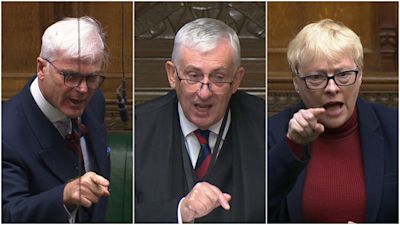Minister refuses nine times to say if public sector pay rise will make workers better off

Political Correspondent Libby Wiener on why public sector wage increases, could actually mean an effective pay cut as the cost of living soars.
The year-long freeze on public sector pay is set to end but the government has been unable to guarantee that a pay rise will make workers better off financially.
Rishi Sunak is expected to announce in his Budget on Wednesday that the constraint on public sector pay rises, brought in due to heavy borrowing during the coronavirus pandemic, can be brought to a close.
ITV News Political Editor Robert Peston looks ahead to Wednesday's Budget
But critics say numerous squeezes on Britons' personal finances - such as a National Insurance hike, increased energy bills and rising inflation - mean that any pay rise will make a negligible difference by the time it is implemented in April next year.
Asked nine times, Small Business Minister Paul Scully would not say whether the pay rise would make public sector workers any better off financially.
"What I don't want to do is speculate six months ahead, but we are ending the freeze - we want to make sure the five million public sector workers can see more money in their pay packet," he said.
Watch: Minister refuses nine times to say if pay rise will make public sector workers better off
With inflation currently at 3%, he would not guarantee that the pay rise would be high enough to beat rising prices.
The decision to stop the pay freeze, according to the Treasury, means that more than five million public sector workers, such as teachers, nurses and armed forces personnel, could be in line for a pay rise next year.
Officials said the Cabinet minister was able to make the move due to the “solid recovery” of the economy since Covid-19 restrictions lifted.
But Downing Street was also unable to say whether public sector workers will get a real-terms rise in wages, after being asked in a briefing with journalists.
The PM's official spokesperson said: "The process is for independent pay review bodies to look at... for them to then come forward to make recommendations to departments on a sector-by-sector basis. I'm not going to pre-judge that process."
Asked if departments will get more funding to cover pay rises, he said: "How departments are funded will be a matter for the SR (spending review) and the chancellor to set out."
Speaking before the expected announcement, Mr Sunak said: “The economic impact and uncertainty of the virus meant we had to take the difficult decision to pause public sector pay.
“Along with our Plan for Jobs, this action helped us protect livelihoods at the height of the pandemic.
“And now, with the economy firmly back on track, it’s right that nurses, teachers and all the other public sector workers who played their part during the pandemic see their wages rise.”
The chancellor had hinted during an interview with broadcasters on Sunday that an announcement on public sector pay was likely to feature in this week’s fiscal statement.
It comes after public sector pay increases were paused in 2021/2022, with the exception of the NHS and workers earning less than £24,000.
Trade Union Congress (TUC) general secretary Frances O’Grady had called on ministers to use the autumn Spending Review to end the public sector pay freeze and give frontline workers a pay rise.
Ms O’Grady made the demand earlier this month after research by the TUC found one in five key public sector workers had declared they were “actively considering” quitting and changing profession due to complaints about low pay, excessive workloads and feeling undervalued.
Pay for most frontline workforces, including nurses, police officers, prison officers and teachers, is set through an independent pay review body which makes recommendations to ministers.
Officials said the government would be requesting “full recommendations” from the respective sector pay bodies, with awards to be announced next year.
Kevin Courtney, the National Education Union’s (NEU) joint general secretary, said: “This is big on promises but short on detail.
“Teachers, support staff and school and college leaders will not have a clear sense this week of what is in store, and there is no prospect of clarity until 2022.
“The Chancellor must do more than win a day’s headlines.
“He must make good on this latest pledge to drive up pay for those who kept this country on its feet throughout the pandemic.”
Unison union general secretary Christina McAnea said the pay freeze would continue “in all but name” unless Whitehall departments were given extra money by Mr Sunak to fund the wage increases.
Royal College of Nursing general secretary and chief executive Pat Cullen said the lifting of the pay freeze was “tacit acknowledgement from ministers they have underpaid nursing staff”.
She said: “With this announcement, Mr Sunak will raise the hopes of many. They and the public will be unforgiving if there’s disappointment in the small print.”
The pre-Budget announcement comes after it was confirmed on Monday that the UK’s lowest-paid workers will receive a pay rise next year as the minimum wage for those aged 23 and over will increase from £8.91 to £9.50 an hour – an extra £1,000 a year for a full-time worker.
From April 1, young people and apprentices will also see their wages boosted as the so-called “national minimum wage” for people aged 21-22 goes up to £9.18 an hour and the apprentice rate increases to £4.81 an hour.